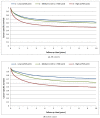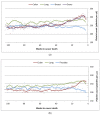Platelet Count and Survival after Cancer
- PMID: 35158817
- PMCID: PMC8833779
- DOI: 10.3390/cancers14030549
Platelet Count and Survival after Cancer
Abstract
Thrombocytosis is associated with cancer progression and death for many cancer types. It is unclear if platelet count is also associated with cancer survival. We conducted a cohort study of 112,231 adults in Ontario with a diagnosis of cancer between January 2007 and December 2016. We included patients who had a complete blood count (CBC) completed in the 30 days prior to their cancer diagnosis. Subjects were assigned to one of three categories according to platelet count: low (≤25th percentile), medium (>25 to <75th percentile), and high (≥75th percentile). Study subjects were followed from the date of their cancer diagnosis for cancer-specific death. Of the 112,231 eligible cancer patients in the cohort study, 40,329 (35.9%) died from their cancer in the follow-up period. Relative to those with a medium platelet count, the rate of cancer-specific death was higher among individuals with a high platelet count (HR 1.52; 95%CI 1.48-1.55) and was lower among individuals with a low platelet count (HR 0.91; 95%CI 0.88-0.93). A high platelet count was associated with poor survival for many cancer types. Platelet count could potentially be used as a risk stratification measure for cancer patients.
Keywords: cancer survival; marginal structural model; platelet count; platelets; thrombocytosis.
Conflict of interest statement
The authors declare no conflict of interest.
Figures






References
Grants and funding
- n/a/Peter Gilgan Centre for Women's Cancers at Women's College Hospital, in partnership with the Canadian Cancer Society
- n/a/Tier I Canada Research Chair in Breast Cancer (Narod)
- n/a/Canadian Institutes of Health Research (CIHR) Frederick Banting & Charles Best Doctoral Research Award (Giannakeas)
- n/a/Tier II Canada Research Chair (Kotsopoulos)
- n/a/Heart and Stroke Foundation
LinkOut - more resources
Full Text Sources
Medical

